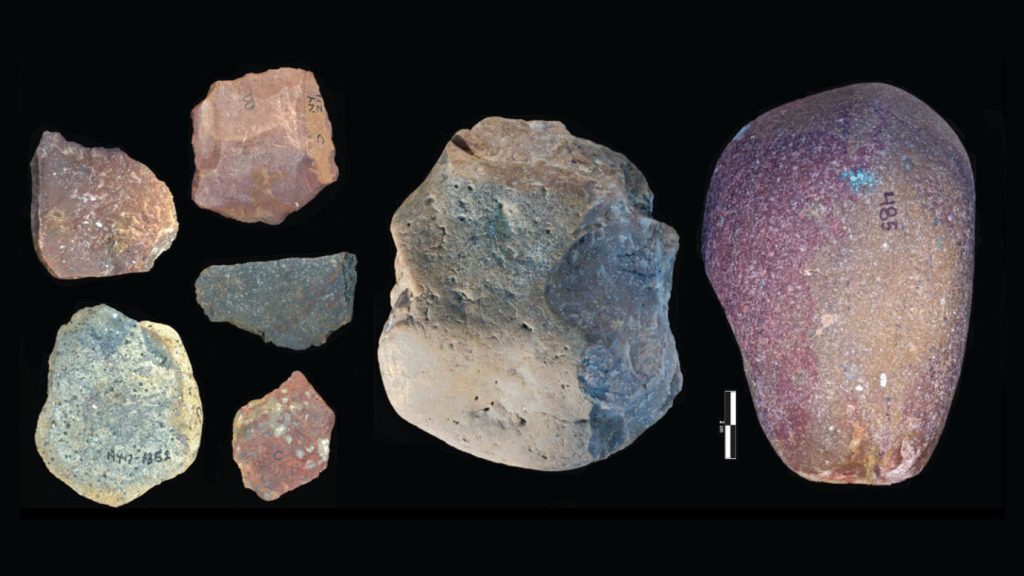Hominids used stone tool kits to butcher animals earlier than once thought
Warning: Undefined array key 0 in /home/www/www.be-bidding.com/wp-includes/media.php on line 795
Warning: Undefined array key 0 in /home/www/www.be-bidding.com/wp-includes/media.php on line 801
Warning: Undefined array key 1 in /home/www/www.be-bidding.com/wp-includes/media.php on line 801
Warning: Undefined array key 0 in /home/www/www.be-bidding.com/wp-includes/media.php on line 803
Warning: Undefined array key 1 in /home/www/www.be-bidding.com/wp-includes/media.php on line 803
Warning: Undefined array key 0 in /home/www/www.be-bidding.com/wp-includes/media.php on line 806
Warning: Undefined array key 1 in /home/www/www.be-bidding.com/wp-includes/media.php on line 806
Warning: Undefined array key 0 in /home/www/www.be-bidding.com/wp-includes/media.php on line 795
Warning: Undefined array key 0 in /home/www/www.be-bidding.com/wp-includes/media.php on line 801
Warning: Undefined array key 1 in /home/www/www.be-bidding.com/wp-includes/media.php on line 801
Warning: Undefined array key 0 in /home/www/www.be-bidding.com/wp-includes/media.php on line 803
Warning: Undefined array key 1 in /home/www/www.be-bidding.com/wp-includes/media.php on line 803
Warning: Undefined array key 0 in /home/www/www.be-bidding.com/wp-includes/media.php on line 806
Warning: Undefined array key 1 in /home/www/www.be-bidding.com/wp-includes/media.php on line 806
Warning: Undefined array key 0 in /home/www/www.be-bidding.com/wp-includes/media.php on line 795
Warning: Undefined array key 0 in /home/www/www.be-bidding.com/wp-includes/media.php on line 801
Warning: Undefined array key 1 in /home/www/www.be-bidding.com/wp-includes/media.php on line 801
Warning: Undefined array key 0 in /home/www/www.be-bidding.com/wp-includes/media.php on line 803
Warning: Undefined array key 1 in /home/www/www.be-bidding.com/wp-includes/media.php on line 803
Warning: Undefined array key 0 in /home/www/www.be-bidding.com/wp-includes/media.php on line 806
Warning: Undefined array key 1 in /home/www/www.be-bidding.com/wp-includes/media.php on line 806
Warning: Undefined array key 0 in /home/www/www.be-bidding.com/wp-includes/media.php on line 827
Warning: Undefined array key 1 in /home/www/www.be-bidding.com/wp-includes/media.php on line 827
Warning: Undefined array key 0 in /home/www/www.be-bidding.com/wp-includes/media.php on line 70
Warning: Undefined array key 1 in /home/www/www.be-bidding.com/wp-includes/media.php on line 71
Warning: Undefined array key 0 in /home/www/www.be-bidding.com/wp-includes/media.php on line 70
Warning: Undefined array key 1 in /home/www/www.be-bidding.com/wp-includes/media.php on line 71

Nearly 3 million years ago, hominids employed stone tool kits to butcher hippos and pound plants along what’s now the shores of Kenya’s Lake Victoria, researchers say.
Evidence of those food preparation activities pushes back hominids’ use of these tool kits, known as Oldowan implements, by roughly 300,000 years, say paleoanthropologist Thomas Plummer of Queen’s College, City University of New York and colleagues. That makes these finds possibly the oldest known stone tools.
Several dating techniques place discoveries at the Kenyan site, known as Nyayanga, at between around 2.6 million and 3 million years old. Based on where artifacts lay in dated sediment layers, these finds are probably close to about 2.9 million years old, the scientists report in the Feb. 10 Science.
Until now, the oldest Oldowan tools dated to roughly 2.6 million years ago at an Ethiopian site more than 1,200 kilometers north of Nyayanga (SN: 6/3/19). Excavations at another site in Kenya, called Lomekwi 3, have yielded large, irregularly shaped rocks dating to about 3.3 million years ago (SN: 5/20/15). But claims that these finds, which include some sharp edges, represent the oldest known stone tools are controversial.
Similarities of the Nyayanga artifacts to those found at sites dating to as late as around 1.7 million years ago “reinforce the long trajectory of Oldowan technology in the early stages of human evolution,” says archaeologist Manuel Domínguez-Rodrigo of Rice University in Houston and the University of Alcalá in Madrid. He did not participate in the new study.
Skeletal remains of at least three hippos unearthed near a total of 56 stone artifacts at Nyayanga display butchery marks, the investigators say. Wear patterns on another 30 stone tools from Nyayanga indicate that these items were used to cut, scrape and pound animal tissue and a variety of plants. And antelope fossils found at Nyayanga display damage from hominids removing meat with sharp stones and crushing bones with large stones to remove marrow.
These discoveries are among 330 Oldowan artifacts and 1,776 animal bones unearthed at Nyayanga from 2015 through 2017. Oldowan finds included three parts of an ancient tool kit — rounded hammerstones, angular or oval cores and sharp-edged flakes. Toolmakers struck a core held in one hand with a hammerstone held in the other hand, splitting off flakes that could be used to cut or scrape.
Whoever wielded stone tools at the Kenya site close to 3 million years ago “had access to a well-balanced diet for hunter-gatherers,” says coauthor Rick Potts, a paleoanthropologist at the Smithsonian Institution in Washington, D.C.
The evolutionary identity of ancient Nyayanga toolmakers remains a mystery. Plummer’s group unearthed two large, peg-shaped molars belonging to Paranthropus, a big-jawed, small-brained hominid line that inhabited eastern and southern parts of Africa until around 1 million years ago. The Nyayanga teeth are the oldest known Paranthropus fossils.
But there is no way to confirm that Paranthropus made and used the newly recovered stone tools. Individuals who died at Nyayanga and left behind their fossilized teeth were not necessarily part of groups that periodically butchered hippos there, Domínguez-Rodrigo says.
Members of the Homo genus appeared in East Africa as early as around 2.8 million years ago and could have made Oldowan tools at Nyayanga, says archaeologist Sileshi Semaw of the National Research Center for Human Evolution in Burgos, Spain (SN: 3/4/15). But Paranthropus can’t be discounted as a toolmaker. A large male Paranthropus skull discovered in 1959, dubbed Nutcracker Man, lay near Oldowan artifacts dated to 1.89 million years ago, says Semaw, who was not part of Plummer’s group (SN: 3/3/20).
Previous discoveries indicated that Oldowan toolmakers eventually occupied much of Africa, Asia and Europe, either via the spread of toolmaking groups or through independent inventions.
Discoveries at Nyayanga fit a current consensus that stone-tool making must have begun shortly after hominids evolved substantially smaller canine teeth around 5 million years ago, says archaeologist John Shea of Stony Brook University in New York, who was not involved in the new study. Stone tools did the work formerly performed by big canines, including slicing prey carcasses, mashing edible plants and helping individuals communicate anger or dominance over others, Shea suspects.
If that tool-crafting timeline is correct, then even Australopithecus afarensis, known for Lucy’s famous partial skeleton, might have made and used stone tools by around 3.4 million years ago (SN: 8/11/10).
Any way you slice it, Oldowan finds at Nyayanga now provide the earliest hard evidence of stone tools.
